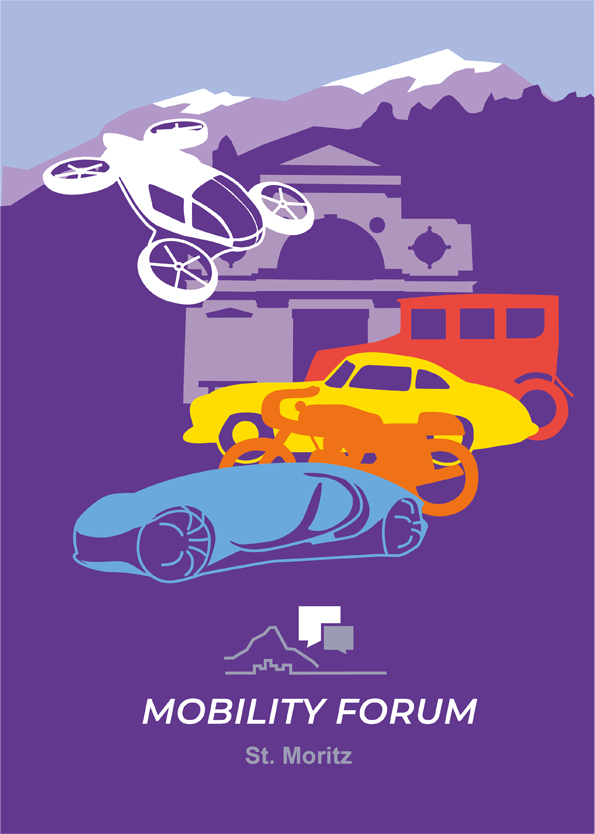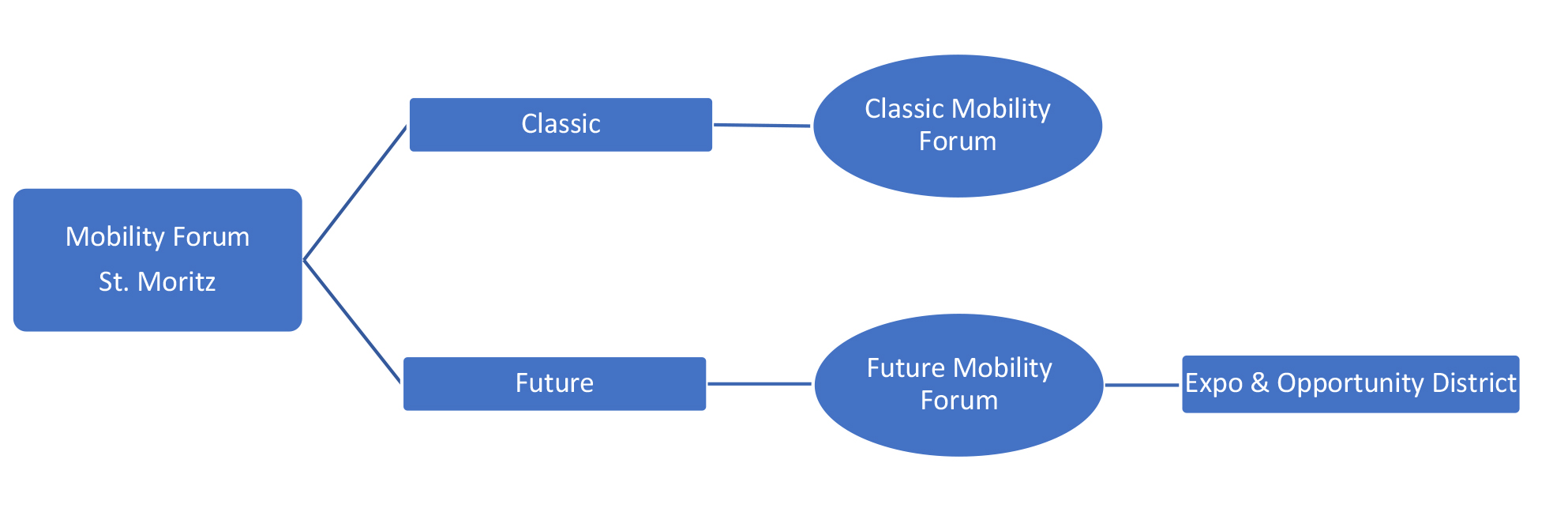
The Mobility Forum St. Moritz
will establish itself as an international and interdisciplinary platform for all aspects of mobility and will become a forum for politicians, decision-makers in the automotive industry, as well as investors and entrepreneurs.
Perspectives and future issues of mobility are presented, proactively discussed and critically questioned. The environment and sustainability play a role, as do questions of individual transport, local public transport or freight transport by road and rail. Modern urban planning or alternative fuels will also find their place in the discussion culture of modern society.
Despite the fact that it is embedded in the International St. Moritz Automobile Week, classic mobility is only one topic among many, especially because this area also directly depends on how mobility as a whole will develop. The focus is therefore particularly on the future.
The comparison of the Mobility Forum St. Moritz with the World Economic Forum or the Munich Security Conference is rather a not entirely serious reference to the fact that everyone started small once. On closer inspection, however, these comparisons are not quite as far-fetched as they might seem at first glance.
Location
St. Moritz (like Davos) offers a particularly safe environment and at the same time is easily accessible. Strictly speaking, even better than Davos, as it also has an international airport, albeit a small one. Moreover, the infrastructure offers everything such a forum needs: Sufficient rooms in a wide range of categories; enough venues to allow almost any number of individual events (even parallel); a wonderful environment in which one likes to spend some time and yet a certain "seclusion" that allows for almost unobserved, very confidential meetings if needed. In addition, the International St. Moritz Automobile Week offers a "free social programme", at least for the first few years.
Alignment
In order to better represent the different requirements, the Mobility Forum St. Moritz will be divided into two sections from the very beginning:
- Classis Mobility Forum
- Future Mobility Forum
In both sections, emphasis will be placed on internationality. The Future Mobility Forum St. Moritz offers itself as a networking basis as well as a contact platform between start-ups and potential investors. The latter will be docked onto the FMF in future in the form of an "Expo & Opportunity District". In addition, the Future Mobility Forum St. Moritz can offer manufacturers and other stakeholders the opportunity to present their products, plans and projects during afternoons or evenings.

Themes
The Mobility Forum St. Moritz will address a wide variety of topics from the entire field of mobility. To illustrate the theoretical range, here are some exemplary topics and keywords:
FMF: Example„Digital Mobility“
The metaverse as a virtual parallel world marks a new age. For the issues of mobility, this can result in new markets with interesting possibilities as well as many open questions.
What innovations are emerging at the digital level for mobility (software, AI)? Who are the future players? How does this "new" digital world work in everyday life? What are the legal framework conditions? Can the state or municipal administration technically follow the digital development? Can data traffic be thematically assigned to general traffic? Many questions, for which there are certainly just as many approaches to solutions, start-ups and investment opportunities.
Themes Future Mobility Forum
- Autonomous driving
- Volocopter, PAL-V etc., transport drones
- Climate Impact - Shared Mobility (Pooling, Car-Sharing, eRoller, Bike-Sharing etc.)
- Transport concepts such as Uber, Grab, Careem etc.
- New public transport concepts such as cable cars, maglevs, etc.
- Innovative mobility concepts, corporate mobility management
- Networking of different concepts
- General mobility management, software solutions for mobility control
- AI solutions for mobility & logistics
- Commuters (pooling)
- Start-ups from the areas mentioned
- Smart city, "15-minute city", connection of rural regions (conurbation)
- Urban planning, transformation thrusts and so-called game-changing projects (what does the restructuring of a European city look like in order to meet the social demands of the future, to increase the quality of life and still guarantee individual mobility to the necessary extent)?
- Femobility (planning by women for women, instead of by men for men)
- Modern traffic management and regulation
- Alternative fuels, e.g. eFuels, hydrogen
- Tourism in a thematic context
- Climate-neutral air transport
- Workshops
- Pitch platform for new concepts, "original ideas" etc. (Expo & Opportunity District)
- Manufacturer presentations of novel concepts
CMF: Example „Historical Mobility“
In the classic sector, there are also countless topics that are already being discussed in the scene, but usually not in the context of a more far-reaching event. The topic area of "historical mobility" with its catchwords arises automatically.
Since the solution of future problems is a prerequisite for the continued existence of historic mobility, the Mobility Forum St. Moritz can therefore profile itself as an interface between the past and the future. The broad topic of collector vehicles, which also includes modern super sports cars, also belongs more to the CMF than to the FMF.
The aforementioned advantages of the location provide the opportunity to discuss relevant topics in parallel. The other events of the ISAW offer the opportunity to experience classic mobility live and thus contribute to ensuring that the historical aspect is not forgotten and falls by the wayside.
Themes Classic Mobility Forum
- Does the combustion engine have a future?
- Connecting the hobby to the future
- Luxury Beyond Cars - Luxury Car Brands, Fashion, Art, Architecture & Design
- Counterfeiting of expensive vehicles
- Insurance issues
- Automotive Heritage & Future Generations
- Next Generation
- Fuel alternatives (eFuels) as the only solution for classic cars?
- Future feasibility of historic driving events and historic motorsport
- Conversion of classic cars to electric drive vs. H-licence plate or FIVA
- Emission regulations, exemptions
- Sustainability of classic cars compared to short-lived new vehicles
- Driving bans in inner-city areas and the consequences thereof (relocation of the hobby to rural areas)
- Uniformity of European regulations instead of countless different initial situations and driving bans/restrictions
- Association work (FIVA, FIA)
- Automobile culture (intangible world cultural heritage, IAK)


